Text
look I think death note is a really poignant satire of the japanese justice system.
(im not japanese but i am american so. im not saying the japanese justice system is worse than my country's or anything)
japan has one of the lowest homicide rates in the world, and one of the reasons for that is because homicides aren't fucking reported as homicides. they're reported as heart attacks or suicides, because the japanese police just want to say that they have a low murder rate and a high solve rate for murder cases: on a personal level they want good numbers so they can get promoted, but on a societal level they want the police to remain the good guys in the eyes of the public. and that's light. "heart attacks" and "suicides" and "accidents" all actually murders, covered up to uphold the societal ideal of the law as the ultimate good.
in japan, 99% of people charged with crimes are convicted. innocent people falsely accused are put under enormous pressure to confess, at which point they often crack under the pressure and accept conviction. and that's L. he put a lot into the theory that light was the culprit even when he had nothing to go on and indeed evidence to the contrary, because he had no other suspects. and remember when he fucking had misa tortured ????? bound standing up with her eyes covered even when it couldn't have been clearer that they weren't going to get a confession out of her and it had been weeks? and he kept it up pretty much solely because he was too proud to admit that he had been wrong, or at least that this wasn't working.
in that way, light is the corrupt police force, and L is the corrupt judicial system. together they make the system of justice, but do either of them actually believe in that? they say they do, but light's "justice" is deference to the law, or rather, the status quo that the law represents; L's "justice" is having someone in prison, someone to blame, and the same perpetuation of the status quo. ideally they'd be able to keep each other in check - the police to arrest a corrupt judge, the court to convict a corrupt officer - but they're really exactly the same. light killed lind l. tailor, but L is the one who sent him to die.
it isn't 1:1 allegorical but it doesn't have to be. it's a thought-provoking and scathing criticism of what the japanese government calls justice. I think it's solid social commentary
#anyone wanna talk about this? it's interesting stuff and I'm really just repeating/building off of stuff other people have said#death note#media analysis#social commentary#political commentary#social criticism#death note analysis#l lawliet#light yagami#japanese government#japanese politics#police corruption#judicial system#acab
58 notes
·
View notes
Text
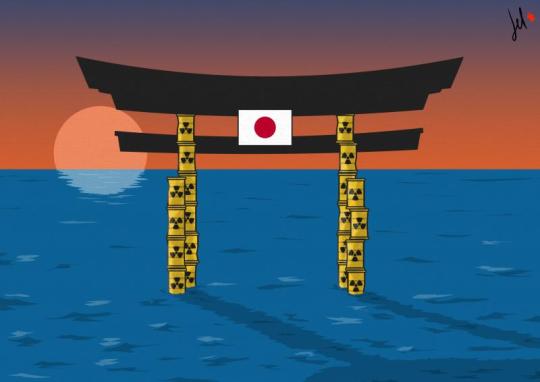
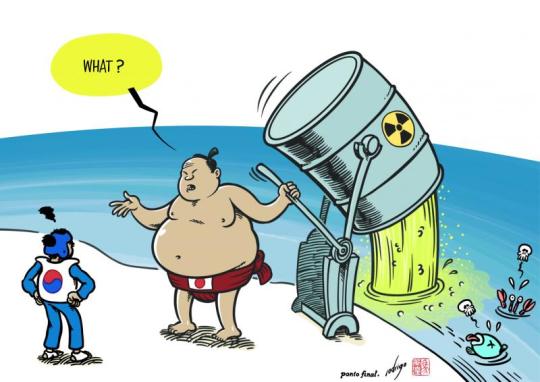
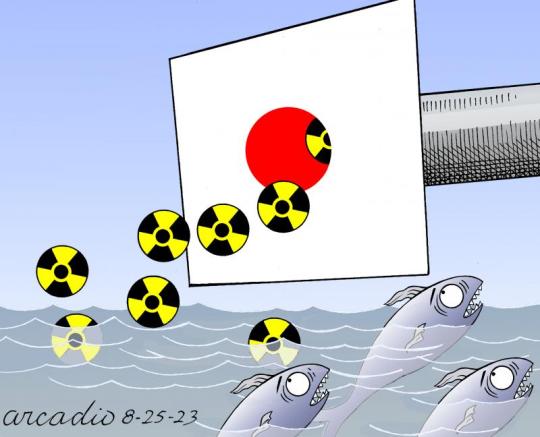
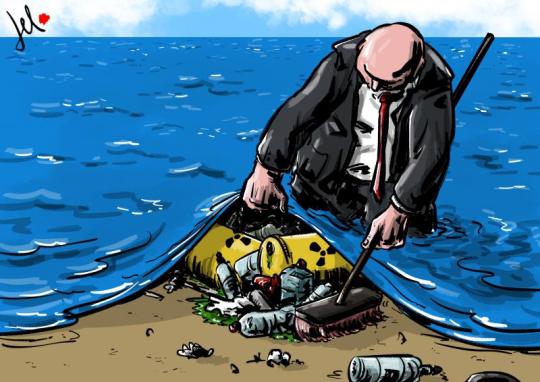
Dear Earthlings, From Fukushima l Cartoonmovement
#art#cartoons#fukushima#japan#japanese government#tepco#ocean#sea#earth#nuclear waste water#treated radioactive water#fukushima wastewater#pacific ocean#environment
40 notes
·
View notes
Link
MAY 8, 2023
Ninety percent of prefectural assembly members with ties to the Unification Church were re-elected in the unified local elections in April, but their popularity showed signs of waning, an Asahi Shimbun survey showed.
The unified elections were the first collective nationwide vote held since the Unification Church came under fire again for its fund-collection methods following the assassination of former Prime Minister Shinzo Abe in July last year, apparently over his ties to the religious group.
According to an Asahi Shimbun survey conducted in August and September last year, 292 of the 2,314 responding prefectural assembly members acknowledged their connections with the church, now formally called the Family Federation for World Peace and Unification.
The ties included attendance at Unification Church-related meetings or events, and receiving support from the group in election campaigns.
The terms for 251 church-connected assembly members expired in spring. Of them, 228 sought re-election in the April 9 elections held in 41 of Japan’s 47 prefectures, while 23 members did not run due to age or other reasons.
Of these candidates, 206, or 90.4 percent, were re-elected. Twenty-two members, or 9.6 percent, lost their seats.
Among those re-elected, 47, or around 23 percent, ran uncontested.
More than 80 percent of the church-tied prefectural assembly members were from the ruling Liberal Democratic Party.
Among all 1,111 LDP incumbents who ran in the local assembly elections, 98 members, or 8.8 percent, were defeated.
Of all 228 candidates who confirmed their ties to the church, 118 gained fewer votes than in the previous election, while 42 garnered more ballots.
It is not clear if the church ties affected vote counts for 68 of the candidates because they ran uncontested in either of the two latest elections, or won in a by-election held within the past four years.
However, some candidates lost several thousand to 10,000 votes compared to their tallies in the previous election after their connections with the church became known.
Setsuko Sakuraba, 65, an LDP candidate, sought a second term in the Niigata prefectural assembly from the electoral district of Joetsu city.
But she was defeated in the election after gaining 9,536 votes. That was 2,459 votes fewer than her total in the previous election, when she placed fourth and gained one of the five assembly seats for the city.
Sakuraba had attended Unification Church-related events and received support in her campaign from people connected to the group.
These ties were reported in local newspapers and The Asahi Shimbun.
After her election loss, Sakuraba said about her church ties, “It’s hard to say how much, but there must have been a significant impact (on the election results.)”
She said someone had placed stickers with words “Unification Church endorsed candidate” on her campaign posters in Joetsu city.
About 50 to 60 of these stickers were found, she said.
In the Tochigi prefectural assembly election, 82-year-old Kazuyoshi Itabashi of the LDP was elected for a national record 14th straight time.
Itabashi gained 10,411 votes in the election four years ago, but this time he received 7,674 ballots, down by 2,737.
He also received the fewest votes among the five elected candidates representing the Oyama city and Nogi town electoral district.
“I think there was a slight decrease in votes,” he said after the election.
In September last year, reports surfaced that Itabashi was serving as head of the prefectural association of a church-related organization called the Federation for World Peace.
He resigned from the position.
Before the election, a Buddhist organization that had supported Itabashi told him that it would withhold its support because of his connection to the Federation for World Peace.
The Unification Church’s public relations department told The Asahi Shimbun, “Our organization has never had involvement with specific candidates or political parties.”
#moonies#unification church#unification church in japan#japanese church#politics#japanese politics#japan#japanese government#ldp#liberal democratic party#ffwpu#family federation for world peace and unification#upf#assassination of shinzo abe#shinzo abe#universal peace federation#front groups#front organizations
6 notes
·
View notes
Text
For the past 70 years, Liu Fenghai has had her sleep interrupted countless times by the same nightmare.
"I dreamed about Japanese soldiers with sabers on their backs hunting me like an animal," Lui, from China's Shanghai province, said.
Liu was sexually assaulted when she was just 16 and her limp, lifeless body left for dead in a ravine by Imperial Japanese Army soldiers. She managed to summon what was left of her energy and crawled back home. The ordeal left her bed bound and unable to walk for over a month.
Comfort women were women and girls forced into sexual slavery by the Japanese during World War II. More than 100 were from Shanghai and those still alive today are still waiting for an official apology from Japan.
On June 13, 1943, Hao Yuelian, who was 15 at the time, was raped by two Japanese soldiers in her own home while her parents were out.
Later that same day, beaten, bruised and shaken from her earlier encounter with the soldiers, she was abducted and put to work in a military brothel to provide sexual services to the Japanese Army. She was kept tied up and raped day and night.
"The Japanese government must acknowledge the crime and apologize. I must live and wait for the day to come," Hao said.
Hao was left infertile due to her ordeal. Hers is not an isolated case. "Nearly one-sixth of the comfort women I visited were infertile because of what they were put through," said Zhang Schuangbing, who set out to interview surviving victims.
Those that struggled, or tried to escape, were murdered, while others committed suicide, and some simply tried to forget what had happened and refused to talk about it.
"I spoke to nearly 130 women in Shanghai, but there were more women in the province who had been forced into sex slavery during the war. I did not get the chance to meet them all," Zhang said.
Some 400,000 women in Asia, half of whom were Chinese, were forced to serve as comfort women during World War II, according to Su Zhiliang, director of the comfort women research center at Shanghai Normal University.
On behalf of the women victims in Shanghai, Zhang submitted a letter of complaint to the Japanese government in 1992. The Supreme Court in Japan threw out the lawsuit in 2007. The three groups of comfort women who tried to sue the Japanese government all passed away without receiving an apology or compensation.
#liu fenghai#hao yuelian#zhang schuangbing#su zhiliang#china#comfort women#comfort woman#japan#military#army#war crimes#japanese government#history#chinese history#japanese history
4 notes
·
View notes
Text
Radioactive water released into the sea.
#radioactive water#japan#Japanese government#not radioactive wastewater#radiation#ocean#released into sea
0 notes
Text
Energizing Communities in Bajura: The Power of Transformation
Unlike many of her friends in her village, 21-year-old Krishna Pariyar never had to depend on her husband financially. Pariyar, a resident of Pilichaur in Jagannath Rural Municipality-1, Bajura, didn’t have to depend on anyone from her maternal home either. Her life took a turn for good when her tailoring business took off. She had invested Rs. 20,000 ($150) in the business. “Previously, I would…

View On WordPress
#AEPC#Alternative Energy Promotion Center#Badigaad Hydropower Project#Bajura#Electricity-powered mill#Japanese government#Kaasgada Hydropower Project#Malagad hydropower cooperative.#Renewable Energy for Rural Livelihood#RERL#UNDP
0 notes
Text
▶️Students at Kyoto University in Japan are striving to support Palestinians amidst the Israeli actions in Gaza.
#FreePalestine #Japan
#free palestine#FreePalestine#japanese#japan#videos#video#freepalastine🇵🇸#free gaza#gaza strip#gaza genocide#gazaunderattack#gaza#rafah under attack#free rafah#all eyes on rafah#save rafah#rafah#ausgov#politas#auspol#tasgov#taspol#australia#fuck neoliberals#neoliberal capitalism#anthony albanese#albanese government#antinazi#jewish antizionism#antizionist
2K notes
·
View notes
Text
I think a lot of Buddy Daddies fans will be interested in this article by Unseen Japan entitled: How discriminatory comments by Japanese Prime Minister Kishida Fumio's secretary may lead to actual reform on LGBTQ+ issues in Japan.
Here is an excerpt from the article (with text provided underneath):

Text: Just days after Prime Minister Kishida minced words on legalizing same-sex marriage, his secretary Arai Masayoshi made things worse. Speaking to reporters off the record, Arai expressed his distaste for sexual minorities, saying, “I don’t want them living next to me either. ”Arai’s comments very much made it on the record. The ensuing backlash led to Kishida summarily sacking him. Arai’s blatant discrimination prompted politicians and activists to decry his comments and reignited discussions on the government’s failure to protect sexual minorities.
(Bold done by me for emphasis and to highlight what Arai said, specifically.)
There are also a lot of quotes by politicians in the article as well. One, Koizumi Shinjiro, makes this comment:

Text: Looking at the news reports on these statements, once again I feel that the government’s efforts to tackle the declining birth rate on a different dimension will never come to fruition if their policy is based on denying diverse values and ways of life [3].
It should be noted that many of the politicians, activists, and every day people in Japan do not agree with these sentiments and actually support same-sex marriage rights. Unseen Japan made a Twitter post about this, which I will link below.

Text: A new telephone poll by Kyodo News says that, in the wake of discriminatory comments against LGBTQ people by PM Kishida’s (former) secretary, a full 64% of people in Japan support same sex marriage rights. Only 24.9% oppose.
And the wild thing is that Buddy Daddies is airing right now, right when it seems like issues regarding same-sex marriage, discrimination, and general rights are all starting to reach a boiling point in Japan. We have this show airing about two hitmen living together and raising a child together. IN MODERN DAY 2023 JAPAN.
That’s the big thing. They aren’t raising a kid together in a made up fantasy land or in a sci-fi future world or in a city based off of NYC. Kazuki and Rei are raising Miri in modern day, 2023, Japan.
When Kazuki and Rei are at Miri’s daycare, listening to her speech with all the other parents (moms, really) like this:

They are going to be perceived as a same-sex couple. When the government official was looking over their paper work like this:
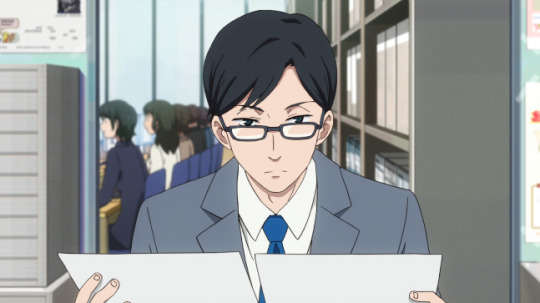
He was perceiving them as a same-sex couple.
We know that one of the theme’s of the series is “two people of the same sex raising a child together.” That was a modern day theme that they wanted to explore. And they are exploring it so mundanely. Like, there are some ridiculous aspects to the series, but those aspects aren’t connected to them being two guys raising a child. The ridiculous stuff usually stems from the conflicting aspects of their job and caring for Miri + their general personalities.
Instead, we are getting a story that is normalizing the concept of a same-sex couple (as society would perceive them) raising a kid together. Right when there is a shitstorm going on in the Japanese government around discriminatory statements about sexual minorities by the PM, the PM’s secretary, and other politicians in PM’s political party in the past (like back in 2018).
This is kinda revolutionary by not being revolutionary at all, and just presenting everything in a realistic and normal way (in regards to the more SOL aspects, anyway). And that, in the current Japanese social and political climate surrounding LGBT+ based issues, makes it a very queer series. Even if the creators weren’t intending on that.
And now, I am done finishing on this topic (at least for now), lol.
#Buddy Daddies#KazuRei#Kazuki Kurusu#Rei Suwa#same-sex marriage in Japan#Japanese government and politics#Japanese society#Japanese LGBT issues#LGBT#queer#queer media#long post#image heavy post
1K notes
·
View notes
Text
finally what youve all been waiting for..... dazai fucking dies 💖
#'wasnt exactly a cakewalk though' 'so the demon needs a clown' 'hes got the entire japanese government by the balls'#'didnt you lock the door' 'sure did! *drops like a stone*' 'i expected your ~special knife~ would deal me a nasty wound but.. poison?'#hes so funny#also#'i hope atsushi and the others are safe' kms#anyway hes soooo hot when he dies waow#posting posting 💕#bsdrewatch2023#swearing cw
69 notes
·
View notes
Text
Inside of me are two wolves.
One really loves the way the fandom moniker "Kabru of Utaya" sounds and how it gives Kabru the dignity of a full name, and how it connects him to his past.
The other knows that "[x] of [location]" is canonically the dwarven cultural naming practice and thus Kabru would never go by it in canon.
#THIS BOTHERS ME SO MUCH....#Kabru#babe. we have GOT to get you a last name.#this is such a potentially painful subject to think about especially postcanon#he's got like ... an official role in government. does he have to sign documents? be announced in court?#like “[x] of [location]” is such a common western fantasy trope and also existed in real life#so naturally we as fans just kind of fill it in ... but Kui had to decide that dwarves do that specifically#so I know that in-universe it would be off the table. like a white person taking a Japanese name or something.#especially when. again. you are a royal advisor. real political blunder territory.#I need to explore this in a fic for real#Dungeon Meshi#posting for one as usual
82 notes
·
View notes
Text
On the 1962 Reorganization of the Unification Church as a Political Tool of Japan, South Korea, and USA
The following is an excerpt from Privatising' Covert Action: The Case of the Unification Church by Jeffrey M. Bale and sheds some light on the alleged 1961-1962 reorganization of the Unification Church for the sake of it becoming a political tool of the Republic of Korea (ROK, or South Korea). As a political tool of post-war ROK, this meant their national goals and strategies had to be in line with the United States of America as well as the nearby Japan, a USA ally (as of 1960) and their former colonizer who they continued to have a tense relationship with. Kim Jong Pil, head of Korean intelligence, decided to more deeply intervene in the Unification Church’s organization and activities as Park Chung Hee came to power. At this time, the the Unification Church substantially became a tool to not just the Korean government, but the U.S. and Japanese government.
Park Chung Hee’s personal opinion on the Unification Church is hard to discern, and his relationship with the church was in no way progressively positive, but Park did not have a personal bias against the “new religion” controversy around the Unification Church, as he was mentored by the leader of the “Eternal Life Church," Choi Tae-min, who claimed to to be the Maitreya. The man who assassinated shot Park, KCIA Director Kim Jae-gyu, admitted after his arrest that one of his motives for the killing was Park’s inability to rid himself of Choi Tae-min’s influence.
As one of Park’s closest aides, Kim Jong Pil headed the negotiations with Japan on normalizing bilateral diplomatic relations in order to help the economic reconstruction of South Korea. Kim Jong Pil continued to use Bo Hi Pak as a KCIA-CIA liaison in the DC area, and in 1962 made trips to the U.S. with KCIA agents and staff that were also Unification Church members. During this trip he also visited the Unification Church in San Francisco. Members from all over the region gathered for this meeting. The following passage outlines some of the events and figures that helped make this happen. You can read the full article here on the HWDYKYM blog.
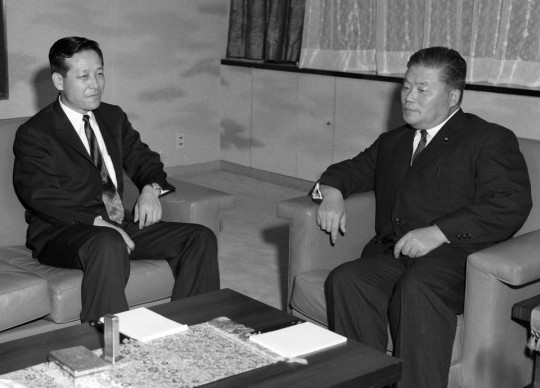
▲ Pictured: Kim Jong Pil, left, and Masayoshi Ohira meet in Tokyo in 1962
The fall of Rhee thus represented a turning point in ROK-Japan interaction. The short-lived democratic government that succeeded him made overtures towards normalization of relations with Japan, an approach also adopted by the Park regime following the 1961 coup. Park and other junta leaders had good economic and political reasons for promoting normalization: they needed Japanese capital to help modernize their country's economy and hoped to stablilize their strategic position by yielding to American pressure to reestablish better relations with Japan. The Japanese government headed by Kishi likewise sought to improve Japan's investment opportunities and strategic position. These official views were to a great extent catalyzed and reinforced by powerful business leaders in both countries, specifically the Korean Businessmen's Association founded in 1961 by a dozen big businessmen and the 'Korea Lobby' in Japan, which included '15 top capitalists' who had established the Japan- ROK Economic Cooperation Organization. It was these latter who financed 'key factional bosses' in the LDP, and their political allies included Prime Minister Kishi and Dietman Bamboku Ono, among others - the very same rightist politicians supported behind the scenes by Kodama and Sasagama, who themselves had economic interests in South Korea.
Of equal significance for our topic, the envoy selected by Park to open 'informal channels' with these pro-normalization elements in Japan was none other than Jong-Pil Kim, who travelled to Japan in October of 1962 - immediately prior to his visit to the U.S., during which he promised Moonies in San Francisco that he would secretly support the UC - to meet with various Japanese leaders, including Kodama's ally Ono. As a result of this visit and a second in November 1962, which Kim undertook on his way home from America, an important step in the normalization process was taken with the formulation of the 'Kim-Ohira Memorandum . If all of this were not suggestive enough, Kodama himself was 'reputed to have been close to former ROK intelligence chief Kim-Chong-p'il and ha[d] been an important channel from Kim to the LDP and Japanese government'. Indeed, according to Japanese journalist Eisuke Otsuka, 'Kodama arranged a meeting inviting Korean representative Kim Chong-p’il and Kishi, Bamboku Ono, and Ichiro Kono and made them disentangle the trouble [regarding normalization] that had lasted for Jour years in short order'. Kim, Ono and Kodama were all later implicated in financial scandals involving both countries.
However, one should not assume that the motives for these contacts were strictly economic. Both Kim and the Japanese kuromaku were concerned with countering communist expansionism, and all three sought to create rightist federations to facilitate this. I have already noted that Kim, Kodama and Sasagawa had worked to strengthen domestic anti-communist forces, and have also discussed some of Kim's operations abroad. It remains only to show that the latter two men were also actively involved in creating and supporting regional or worldwide groupings like APACL and WACL, and that one of the instruments they made us of - probably at Kim's urging - was Moon's UC.
On Kim Jong Pil’s meetings with the CIA, Bo Hi Pak, and California Moonies, excerpted from Gifts of Deceit: Sun Myung Moon, Tongsun Park and the Korean scandal by Robert Boettcher with Gordon L. Freedman:
Kim Jong-Pil made a two-week official visit to the United States as KCIA director in the fall of 1962. Included in his entourage was Steve Kim as interpreter. The Korean Embassy mobilized for the occasion, and the Kennedy administration rolled out the red carpet. Lieutenant Colonel Bo Hi Pak was the Embassy’s officer in charge for Kim’s meetings with CIA Director John McCone, Secretary of Defense Robert McNamara, and Defense Intelligence Agency head Lieutenant General J. E. Carroll.
En route home, Kim Jong-Pil met secretly in his room at the St. Francis Hotel in San Francisco with a small group of Moon’s early activists, who had been sent to proselytize on the West Coast, and some American converts. Kim Young-Oon, beginning in Eugene, Oregon, in 1959, had moved to Berkeley, California. Choi Sang-Ik [Papasan Choi], having established the church in Japan, had moved to San Francisco. Kim told them he sympathized with Moon’s goals and promised to help the Unification Church with political support from inside the government. He said he could not afford to do so openly, however, which fit Moon’s plans perfectly.
Kim Jong-Pil had learned from Moon’s followers in the KCIA that Moon was a zealous anti-Communist. That could be useful to the government. He was also aware of Moon’s ambition to build influence in Korea and beyond. That could create problems for the government if the influence were not properly channeled. Moon was anxious to increase church membership in cities and villages throughout the country. Fine, thought Kim, just as long as they don’t get out of bounds. The KCIA must be the one calling the shots. He decided the Unification Church should be organized satisfactorily to be utilized as a political tool whenever he and the KCIA needed it. Organizing and utilizing the Unification Church would be a simple matter anyhow. After the military coup overthrew the elected government in 1961, all organizations in Korea were required to apply for reregistration with the government.
John Lofland discusses the visit in Doomsday Cult: A Study of Conversion, Proselytization, and Maintenance of Faith (1966, 1977). HWDYKYM identified the aliases Lofland used. The book was a study of the Unification Church group led by Young Oon Kim in San Francisco in the early 60s.
The most spectacular of these visits supported the feeling that UC political control of Korea was imminent. In November 1962, the mass media reported the official United States visit of a Korean political figure known as the “Director” [KCIA Director, Kim Jong-pil]. A feature story on Korea and the Director’s visit appearing in a national news magazine said he was the mastermind behind the then current Korean military junta [of Park Chung-hee]. He “provides the ideas, the drive, the plans. By his own immodest but unchallenged statement, [he] is the dominant figure of … [the] ‘revolution.’ ” After talks with high level officials in Washington, the Director spent two days in San Francisco before returning to Korea. He stayed in a luxurious hotel that flew the Korean flag over its main entrance in order to honor his presence.
The day of his arrival, Miss Kim received a phone call from the Director’s aide and interpreter, a Korean army colonel and UC member. He told her that he had arranged an audience with the Director for Miss Kim and her followers. Miss Kim and five core converts appeared at the hotel the next afternoon, where they met another of the Director’s aides, who had only recently converted to the UC. Before entering the Director’s suite, the Koreans conversed excitedly in their native tongue, while American members stood around and giggled with joy. The audience with the Director himself consisted of Miss Kim telling him of her work for the UC in America, after which each local member gave a brief testimony to the UC/Divine Principle’s wonders and how it had changed their lives. The interpreter translated for the converts and for the Director, who continually smiled, nodded, and chain smoked. There were soft drinks, and toward the end of the hour the Director said that he was not a religious man but had great sympathy with UC. He could not help them publicly in Korea, but he would secretly give them a hand whenever possible.
After the audience, the members assembled in the interpreter’s room, where pictures were taken and an air of family festivity reigned.
Dinner talk back in the UC Center focussed on the audience. Miss Kim emphasized that such a meeting was unique and had occurred only because the Director had high regard for his two aides who were UC members. Note was made of the recently converted Colonel being related by marriage to the junta head and thus having direct access to him. The Director’s interpreter, Miss Kim reported, was also his speech writer. When assigned to write a speech, he always got help from a top-ranking person in Moon’s movement in order to give the speeches a Divine Principle slant. Church members had a strong suspicion that the two aides would eventually convert the Director, Kim Jong-pil.
Since Sun Myung Moon was to control the world by 1967, control of his home base [Korea] would certainly come before that time. Although UC members in America were obscure and ignored, even the most skeptical had to agree that, for some months in 1962 at least, Korean control was not a fantasy. Members had access to the people whose conversion could have given them power, if only in a short-lived coup. In any event, after their meeting with the KCIA Director, Kim Jong-pil, members possessed an important sense of being secretly near the center of power in Korea. Was this not testimony to the Unification Church member’s truth [the Divine Principle]?”
Michael Mickler on Kim Jong Pil’s visit to San Francisco, excerpted from A History Of The Unification Church In America, 1959–74 - Emergence of a National Movement:
Chairman of the newly emerged Supreme Council for National Reconstruction (SCNR) in Korea, Jong Pil Kim journeyed to the United States in November, 1961, for talks with American leaders and a meeting with President John Kennedy. After the talks, he spent two days in San Francisco before returning to Korea. During his stay in the Bay Area, Miss Kim received a call from a Colonel Han, a church member and one of Jong Pil Kim's aides and interpreters. He had arranged for Miss Kim and five American members not only to attend a reception but also to have an audience with the chairman.
At the reception, members met another aide who had recently joined the church, and in the private audience Miss Kim spoke of her work in America. In addition, each American member gave a brief testimony of their experiences with the church. While the meeting was relatively routine, its significance was enormous for a community which was struggling with obscurity and rejection.
On Kim Jong Pil’s visit, excerpted from the 1978 Report Of The Subcommittee on International Organizations Of The Committee On International Relations U.S. House of Representatives:
While in San Francisco, Kim Jong Pil stayed at the St. Francis Hotel. There he met secretly with a small group of UC members, who were among Moon's earliest followers in the United States. The subcommittee staff spoke to a person present at the meeting between the UC members and Kim Jong Pil, who recalled that Kim told UC members he would give their movement political support in Korea, though he could not afford to do so openly. A former U.S. official who accompanied Kim during his stay in San Francisco corroborated the story about the private meeting.
Note: Mickler says November 1961. Lofland and Boettcher/Freedman say Novemeber 1962.
Related
“Moon’s Law: God Is Phasing Out Democracy”
Robert Parry’s investigations into Sun Myung Moon
The Political Setup of Moon’s Organization – a 1977 Report. Kishi Nobusuke and Park Chung-hee are mentioned
In order to rule the world, Sun Myung Moon had to start with Korea.
“Moon used to play golf regularly with Kim Jong-pil”
Fraser Committee Report on Moon org.: “these violations were related to the overall goals of gaining temporal power.”
Sun Myung Moon’s One-World Theocracy
The Moon Organization and the KCIA – ‘Privatizing’ covert action
#Kim Jong Pil#kim jong-pil#kodama#yoshio kodama#sasakawa#Ryoichi Sasakawa#moonies#unification church in japan#japanese church#unification church#politics#japan#south korea#republic of korea#japanese government#us government#park chung hee#Syngman Rhee#1961#1962#Bamboku Ono#nobusuke kishi#kishi#liberal democratic party#japanese politics#right-wing politics#church history#early church history#unification church history#history
2 notes
·
View notes
Text
I was trying to learn more about Japan's parapsychology craze in the 80s and 90s and was having a surprisingly difficult time finding good sources on Google. So I kept trying different search terms and finally this comes up

cia??? freedom of information act???
Anyway!! I clicked on it and the page is "down for maintenance" and I have never been more consumed with curiosity lmao.
I had no idea that Google would search through FOIA documents...
#I genuinely don't even know how to tag this lmao#I KNOW I HAVE NICHE INTERESTS BUT THEY'RE NOT LIKE... 'OF INTEREST TO THE GOVERNMENT' NICHE..#I remember reading an article about the institutes that did research on 'gifted' children in Japan...#I think Sony did one?#I showed dad late night with the devil the other night so I've been thinking about all that#I know more about the American parapsychology craze but I'd like to learn more about the Japanese one#I remember being really fascinated by the very different attitudes Americans vs Japanese have about NRMs and such#while I was taking a class on NRMs in college#and there's some overlap with the whole esper thing#don't mind me I'm just rambling about topics that like five other people on earth care about
39 notes
·
View notes
Text









There are so many moments in Dead Dead Demon's Destruction that are just so pointed and devastating but this one really hits man. I'm kind of wondering if it was written after the Logan Paul thing happened, though of course it's probably referencing a lot of things related to a general American attitude that is, uh, timeless.
#also they got someone really fluent in English for this part so i got to hear someone say 'what the fUCK' out of nowhere#the closed captions skip a lot of the swearing they're doing it's like fuck every other word#using my limited time at a coworking space that has internet my mom's neighbors invited me to collecting anime screenshots for reviews#my priorities are great#it's just as hard on the Japanese government but every time it goes after America I'm like yeah you're so right we suck#dead dead demon's dededededestruction#dead demon's destruction
48 notes
·
View notes
Text
Civic duty and Shinto
OK, so the title might be a bit of a misnomer.
I wanted to do an article which talked about the Japanese sense of civic duty and how it relates to Shinto only to have my search results popping up nothing but articles about State Shinto. Somehow any attempt to connect Shinto with the Japanese sense of civic responsibility is seen as bad from the typical western mindset. Undoubtedly a mindset being pushed by the same sort of people who want to throw out the Constitution's restrictions on Church and State. For the people who are so quick to point out how bad State Shinto was I suggest removing the word "Shinto" and replacing it with "religion". State Shinto sought to present the Emperor, and the Government by extension, as infallible. People who want to push their religion into government are in fact attempting to do the same thing. And it's not about putting Jesus back into schools, it's about power. Just as it was about power when the Japanese government began to create mandates that effected Shinto. When the government is in a position to dictate what people are allowed to believe and how they worship it can never end well. My own brother is so brainwashed that he gets enraged if anyone points out anything that threatens his world view.
At the end of the Pacific War (WW2) Shinto organizations found themselves in the rather awkward position of having to demonstrate that they were not branches of the government and were in fact religious organizations that had been misused by the government. Secular verses non secular. (https://www.jstor.org/stable/26854498?read-now=1&seq=4#page_scan_tab_contents)
At the same time there was a drive to eliminate all forms of religion seen as a cult to the western mindset. With Shinto falling into that awkward middle ground of being both a religion and not a religion at the same time it's a wonder it survived at all.
State religion sets out to create a leader, a king, or a president as infallible. Individuals within a certain party within the US are in fact actively trying to force their religion on everyone. The Supreme Court of the United States has proclaimed that the POTUS can not be prosecuted for official acts. So what is an official act? Well, pretty much any order given under an official capacity. Suddenly what at first seemed cut and dried starts getting kind of murky. Kind of like how it's near impossible to sue the police for violating people's rights. The police can literally rob people under a legal umbrella. It might be drug money/proceeds, guilty until proven innocent. Civil forfeiture.
Yes, this post is political in nature.
I strongly encourage everyone to register to vote, and vote. Not just in the big national elections, but in the little local elections. Japan, who's streets are some of the cleanest in the world and who are looked at for having pride in their civic responsibility, has a dismally low voter turnout. Lower even than the United States, and the US Voter turnout isn't much better. About average on the world stage.
In Shinto we see the world with reverence. Something that both looks after us and in turn must be looked after by us. How then can so many of us sit by and allow those who would throw it all away have their way?
Register to vote. Vote. I'm not going to tell you who to vote for. That's up to you. Just vote. Your vote may be far more important than you realize. I watched the Tony Gonzales / Brandon Herrera election in Texas a while back and the split was only 407 votes. The turnout was abysmal. In the upcoming national election the polls are neck and neck. One vote could flip the vote.
#shinto#japanese culture#vote#register to vote#religion in government#us elections#american politics#election 2024#your vote is more important than you realize
14 notes
·
View notes
Text
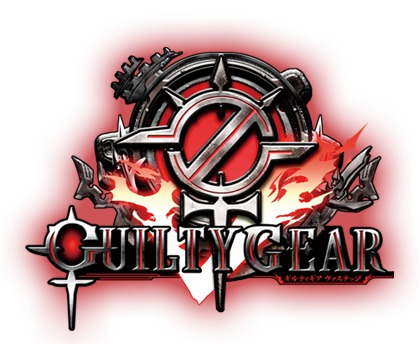
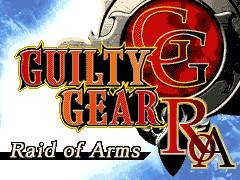


Working on the GG wiki means making weird discoveries, such as the 4 most cursed Guilty Gears sharing a logo font (Vastedge, Raid of Arms, Dust Strikers, Judgment)
#photopost#Raid of Arms is pretty much lost media but it was essentially Judgment Lite for the Guilty Gear Club online/mobile device service#We got REEEAAAALLLLYYYY close to getting our hands on a copy#But the guy that had it had their copy on a device needed for a project funded by the Japanese government#Which meant under law they could not distribute it without dire consequences#Maybe it'll be our Dirge of Cerberus Lost Episode one day#(another JP mobile game thought lost but they found it through sheer luck)
38 notes
·
View notes